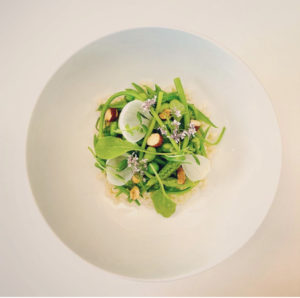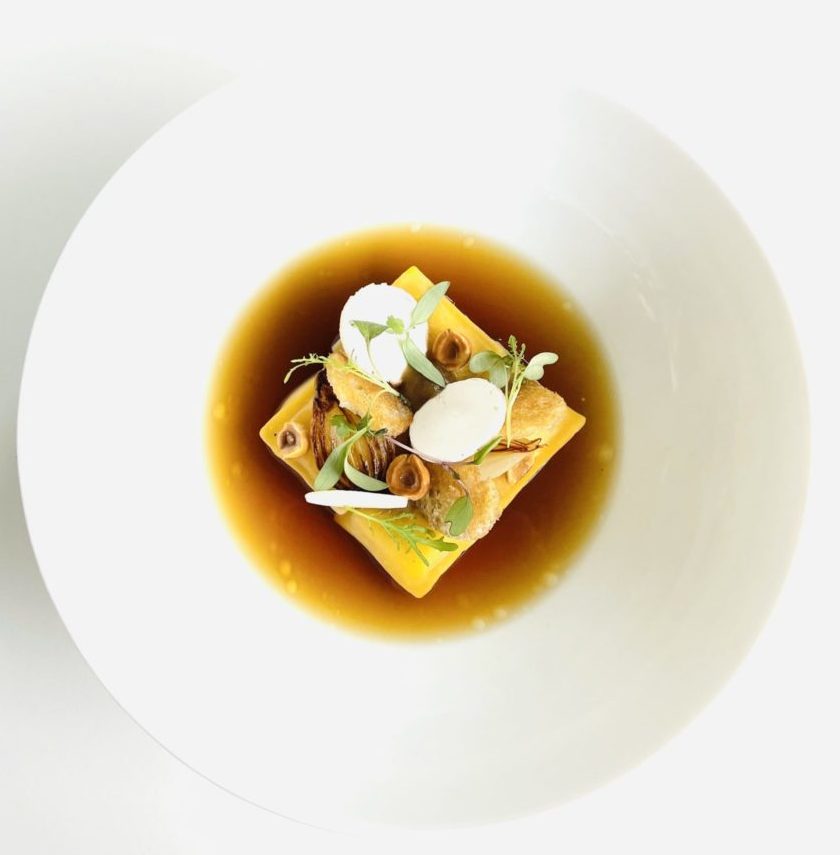To complement our article onsustainable food, here’s the full interview with chef Jérôme Bru.
Can you share with us your vision of sustainable food?
More than a vision, it’s a veritable ethical and conscious food revolution. It’s all about a different way of looking after your health, with a focus on respecting seasonality and paying attention to where products come from.
It’s also about working with local players to select quality products, achieving nutritional balance on the plate, and then simply enjoying the food. I would add that it’s just as important to cook and learn how to preserve food. Sterilization, for example, makes it possible to preserve a product at a key moment so that you can have it all year round. Making a tomato sauce in the middle of July and putting it in jars is sustainable, but buying zucchini on December 31 is unreasonable.
Our job as chefs is to cook a large part of the region’s diversity to share it with as many people as possible, and to continue to offer vegetarian menus and dishes in our restaurants. We are the penultimate players in this magnificent chain before the consumer, and that’s where our message comes through.
At your level, what are you doing to respond to current sustainable/responsible food issues? Are you planning to get involved in any projects or events in the coming months?
We introduced vegetarian menus 6 years ago, and it wasn’t easy, but in 6 years we’ve noticed that our customers are increasingly sensitive and attentive, and are paying more and more attention to sensible consumption.
We have also selected our vegetable and berry producers Les Jardins de Nicolas in Beaumont, organic eggs and baby vegetables from Léa, aromatic plants from Radix, or from a herbalist for our dried plants for culinary infusions and pastry-making, our poultry from Daniel Raymond in Cantal, flours, and sunflower oil from the Allier, walnut, hazelnut and almond oils from the Vensat mill, our trout from the north of the Aveyron, and other meats from Lozère or the Allier (label rouge). We also pick dandelion flowers, acacias and elderberries, as well as blueberries, I hope this year.
Our next project is to label the restaurant as an eco-responsible table, to guarantee our customers and future customers our sensitivity and shared values.
I also have many other projects around food and its preservation, such as improvised dinners in gardens, at a producer’s home… and sponsoring beehives for our honey and natural sugar needs. Finally, I’d also like to share and teach our knowledge in elementary school, supporting educational projects around food.
Do you find it difficult to combine your values with your job? If so, what are they and how do you overcome them?
I think we can still learn, study and design our menus and the composition of our dishes more precisely around nutritional values, I’d like to have more time to experiment with textures, lacto-fermentation for example we do a little but there’s so much to discover….
On the other hand, does cooking sustainably bring you benefits? If so, on what points?
The biggest advantage, I think, is above all HUMAN, and that’s what I feel in all the meetings and links we have with producers. These are privileged moments when we listen to each other’s work. When a product is handed over to us, something magical happens. This is also the case with all the people who have worked with me in the kitchen: exchange, sharing, one person’s idea and another’s experience, allowing creativity to evolve over time. Exchanges with customers are also important, and although they are sometimes rare due to lack of time, in the end they are always a source of goodwill and help us to progress.
Do you have an example of a concrete action you’ve implemented in your kitchens?
One of the most important things we do is not to throw anything away. All our trimmings, whether vegetable or animal, are used to make our sauces and broths, and nothing raw is tolerated in the garbage can.
Another action is the involvement of all staff in offering customers a box to take away the rest of their plate, as well as working on menu preparation and knowledge of the products used.
Finally, do you have a favorite sustainable ingredient that you really enjoy using?
It’s not an ingredient, but a family of ingredients: cereals.
I’m interested not only in their nutritional qualities, but also in discovering and mastering cooking techniques and textures, and their possible variations (in flour, for example, which widens the field of possibilities).
The last cereal to be discovered is fonio, which can be cooked directly as seeds, but also with flour.
We have also used sorghum flour in conclusive tests on pastry doughs. The result is a pronounced crispness, and the moisture content of the dough can be controlled.
Our next project is teff, which is described as a flavor enhancer. We also want to work with lactic ferments for patisserie.
Finally, we are currently using buckwheat flour produced in the Allier region for roasting trials, with the aim of obtaining different notes and flavors for our fresh pasta and ravioles.

Many thanks to Jérôme Bru for his involvement, his time and his cooking, whose images are already making our mouths water. See you soon…
[/et_pb_text][/et_pb_column][/et_pb_row][/et_pb_section]
